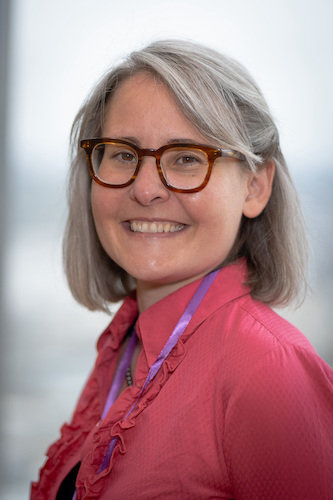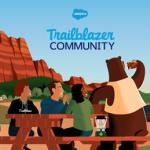EPAM’s collaboration with LDN Apprenticeships has fuelled a diverse talent acquisition strategy for the company and nurtured an impactful culture of growth and development. In this interview, Rebecca Davis, Director, Experience Consulting at EPAM Systems, Inc, gives an insight into exactly how the talent partnership works, how early-in-career Trailblazers can thrive and why other employers should ‘take the plunge’.
Hi Rebecca. Please introduce yourself, your company and a little about your role.
I’ve been in Salesforce consultancy for more than ten years. My heart and soul are weaved into my primary role as a Business Analyst. Now, I oversee a team of Salesforce Functional Consultants and Solution Architects in Western Europe at EPAM Systems, a leading digital transformation services and product engineering company.
Why is EPAM interested in bringing new talent into the Salesforce ecosystem?
The Salesforce ecosystem is relatively small, especially in the UK. To achieve our growth targets, we need to be creative in sourcing people and staffing our projects.
Why and how do you work with LDN Apprenticeships?
We chose to work with LDN for a few reasons:
1. LDN share our values and is focused on the individuals’ success, rather than the utilization of the individual.
2. We wanted to find people with different backgrounds, not just fresh out of university.
3. We liked that they provided Salesforce Admin training, which requires less onboarding time for us.
4. It’s a way for us to give back. Our Head of Delivery entered the corporate world via an apprenticeship program. LDN gives us an opportunity to create similar experiences.
We work with LDN in several ways. Previously, we virtually met with a cohort of 10-15 people and a few EPAMers to give a presentation about our business before moving to informal interviews. If we got a good feeling about an individual, we would arrange a longer chat in the coming days before a final interview. Nowadays, we work on more of a ‘needs’ hiring process. If we know we have a need coming, we inform LDN, and they let us know who they feel would be well-suited for our business and requirements. We meet with everyone LDN sends through and arrange for candidates to meet more EPAM colleagues. Both processes help us find new talent in the Salesforce ecosystem.
How can these types of talent partnerships accelerate company growth?
They help reduce the risk of hiring net-new talent. We only consider hiring those who have the Salesforce Admin certification, and these talent partnerships have already found capable candidates and provided the right training. They will then offer further training to these candidates around specific roles. For example, with LDN, our apprentices also receive training and certification in Business Analysis.
What do you look for in the candidates you hire?
We expect candidates to have obtained the Salesforce Admin certification before we
consider them for an interview. When meeting candidates, we are open to those with a range of experiences – from those just finishing school to others who are cross-training into a new career. We expect our candidates to explain how they managed a difficult situation and worked with others to get through it. We also ask them to tell us about how they manage tight deadlines to complete a task, and how they approach the problem given the time pressures.
For example, Janet Okuyemi was fresh out of university when we were interviewing. We were impressed that she managed to do the three peaks challenge – so we knew she could set goals and work towards them. She already had a mathematics degree, showing she could understand complex logic. She was also the first in her cohort to get the Admin certification, so we knew she was a quick learner.

How do you onboard new starters?
Our Junior Consultants will typically go through about two weeks of workshops hosted by several of our Salesforce functional consultants. We start at the very beginning by providing an overview of the software development lifecycle and project governance, through reading a statement of work to prepare for the beginning of a project and to write user stories. It’s an excellent opportunity for new starters to get to know the rest of the team who reflect on and share their personal experiences.
What does career progression typically look like?
Junior Consultants shadow Senior Functional Consultants on projects for the first 12-18 months, offering support by taking all the meeting minutes during discovery workshops. They usually work on a subset of user stories, providing testing support and possibly doing the admin/config work to deliver some of the stories.
It’s worth noting that we would not have Junior Consultants ‘alone’ on a project in the first 18 months. We carefully consider who to pair them with for each new assignment and as they progress, more and more responsibilities are given.
What tips would you give to someone who wants to work for you?
- Find a way to get the Salesforce Admin certification through self-study via Trailhead or through a talent partnership company (like LDN Apprenticeships).
- Review the Admin Skills Kit to help you demonstrate how your soft skills are transferrable to the specific role you are applying for.
- Come to the interview prepared to share experiences around difficult situations and achieving goals.
What’s your advice for other employers who might consider this route for new talent?
Take the plunge! There are plenty of unexpected benefits to bringing in new talent to your team. You will gain a wonderful new employee, and your team will benefit as they take the apprentice under their wings and show them the ropes. This is an excellent opportunity to foster a supportive community and build a great team driven for success. Clients typically welcome junior consultants to join their projects and are pleased to witness the growth of their development during this time. While some upfront investment is needed, there are positive benefits to the bottom line.
Learn more about the benefits of this case study.






















